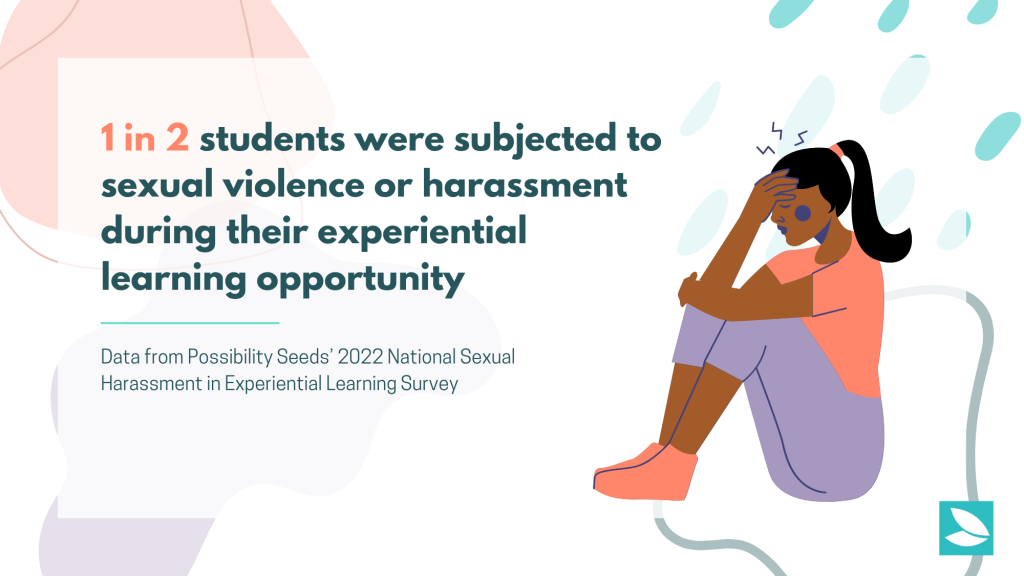|
Getting your Trinity Audio player ready...
|
In fall 2022, Possibility Seeds surveyed students, staff and faculty at post-secondary institutions across the country about their experiences, observations or understanding of sexual harassment in experiential learning. This survey was part of the first national research-to-action project looking at what has been a prevalent but often ignored, overlooked and hidden issue in post-secondary and career development spaces. Up until this point, the reality that students are subjected to sexual harassment in experiential learning has been missing in research, with significant and harmful gaps in policy, legislation, training and support.
One of the reasons this issue has been overlooked for so long is that it can be confusing to know who is responsible for creating safe, harassment-free spaces for students, who are often straddling the line between student and employee. Is it the responsibility of the post-secondary institution, the experiential learning provider, the government?
One in two post-secondary students have been subjected to sexual harassment during an experiential learning opportunity, the survey shows. This is all of our responsibility – and we have to act.

But we know that sexual harassment isn’t a simple problem with a simple solution. It can feel overwhelming to know where to start. So, what are some things you can do now to contribute to a collective, ongoing fight for a safer future?
1. Recognize the issue
One of the biggest hurdles to overcome to address sexual harassment in experiential learning is how normalized and accepted it is. In our research, consultations and conversations with students across the country, a common sentiment we heard was how sexual harassment is a “price to pay,” that it’s something to “put up with.” One student even shared how they were subjected to “terrible emotional abuse because of [their] gender,” that included “racist, sexist, and homophobic comments,” but concluded that “nothing actually *happened* to [them].” In fact, the No. 1 reason that student survey participants chose not to report sexual harassment was that they didn’t think it was “serious enough.”
Too often, our society downplays sexual harassment as “what happens” or “how people act,” failing to recognize the harm and violence that is occurring. And students pick up on this. They learn – from their instructors, supervisors, colleagues and the people around them – to “brush it off,” to stay silent.
Britney De Costa will be presenting a session on “Sexual Harassment: A Price Students Shouldn’t Have to Pay” at CERIC’s Cannexus24 conference, taking place virtually and in-person in Ottawa from Jan. 29-31, 2024. Learn more and register at cannexus.ceric.ca.
2. Advocate for institutional policies and protocols to respond to sexual harassment in experiential learning
Consistently, participants in our research spoke to the need for clear policies and a specific protocol for how the institution will respond to sexual harassment in experiential learning. An institutional protocol allows your response to be consistent, attentive to legal and regulatory contexts, and helps to address concerns around responsibility and liability. It is also a clear way to demonstrate to students that this is an issue the institution takes seriously and is prepared to respond to.
“Too often, our society downplays sexual harassment as “what happens” or “how people act,” failing to recognize the harm and violence that is occurring.”
Possibility Seeds’ “Building a Protocol for Post-secondary Institutions to Respond to Sexual Harassment and/or Violence in Experiential Learning” workbook is a free resource to support building your institutional protocol, and includes a template letter to send to senior administrators at your institution to help generate buy-in and support.
3. Prepare to respond to disclosures of sexual harassment
It can feel daunting to receive a disclosure of sexual harassment from a student. Knowing how to respond in a way that balances meeting the needs of the student with your professional obligations and responsibilities is a lot, especially when you also need to take into consideration the impact it can have on your own well-being. But as we begin to recognize the issue and advocate for institutional policies and protocols, a reality is that more students are going to feel safe to disclose their experiences of sexual harassment. It’s incredibly important that you’re prepared to respond appropriately.
“Responding to Sexual Harassment in Experiential Learning: A Toolkit for Staff and Faculty at Post-Secondary Institutions” is a free resource that includes a workbook with reflection questions, educational resources and fillable templates to help you prepare to respond to disclosures of sexual harassment. You can also learn about the ARC (Acknowledge, Respond, Connect) Model for responding to disclosures.
We cannot solve the issue of sexual harassment overnight, but with a collective commitment from post-secondary institutions, experiential learning providers and governments to prioritize the safety and well-being of students, we can work toward a transformative future where sexual harassment is never the price students pay for entering their industry or building their careers.
You can read the full report on the findings from Possibility Seeds’ Sexual Harassment in Experiential Learning Research-to-Action Project, including 23 recommendations for post-secondary institutions, experiential learning providers and governments.




